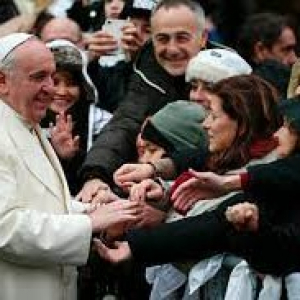Peter MALONE
Don't Look Up
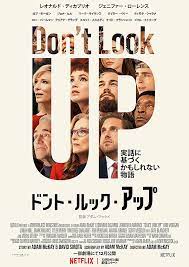
DON’T LOOK UP
2021, 138 minutes, Colour.
Jennifer Lawrence, Leonardo DiCaprio, Rob Morgan, Meryl Streep, Cate Blanchette, Jonah Hill, Mark Rylance, Tyler Perry, Timothee Chalamet, Ron Perlman, Ariana Grande, Kid Cudi, Himesh Patel, Melanie Lynskey, Michael Chiklis, Paul Guilfoyle, Robert Joy.
Directed by Adam Mackay.
If we do look up, at the sky at night, we see many stars. And if we do look at the cast list of this film, we see quite a lot of stars, including five Oscar winners. What are they are all doing in this offbeat film?
Perhaps the film could have had a subtitle, It’s a Mad, Mad, Mad (incoming asteroid) World. And, with the prospect of asteroids hurtling towards earth, 9 miles wide, due in just over six months, we remember the late 90s, Deep Impact, Armageddon. And filmmakers and audiences alike recall very seriously those decades ago, bravely going into space to destroy or deflect the asteroid, or, standing on the beach in face of a tidal wave, accepting fate. (And both of these are relevant to Don’t Look Up.)
But, the millennium year has come and gone, not quite as apocalyptic as we might have imagined (though 9/11 soon to come, war in Afghanistan, invasion of Iraq…). The world has become quite blasé – but this film was made before and during the early months of covert.
Adam Mackay used to make funny films with Will Ferrell and John C Reilly (like Anchorman). More recently he has stayed with the funny but has been preoccupied with serious themes, American social and culture themes (the world of finance, The Big Short and into the Bush administration White House, Vice). It is hard to know whether to describe Don’t Look Up as serio-comic or comically serious.
It begins seriously. Jennifer Lawrence plays Kate, a Michigan-based astrophysicist who discovers the previously unknown threatening asteroid. And her professor is Randall, Leonardo DiCaprio. They are in earnest and contact a professor, Dr Oglethorpe (Rob Morgan) and decide that this devastating news with its imminent deadline, should be communicated to the US president. So far, so sensible.
However, after writing and directing Vice, and experiencing the Trump years, his view of the White House is dim, hyper- critical. The scientists are made to wait, not particularly well believed, the White House deciding to sit on it because of the impending midterm elections. And the president is played by a bespectacled Meryl Streep (remembering that Donald Trump declared she couldn’t act), with her chief of staff, her son, played by Jonah Hill (remembering Jared Kushner).
So, we see the tone begins to turn comic, even farcical (as the military general charges the visitors for snacks – and then they discover that they are free!). While the President and son go to the media with Trump-like professionalism, the scientists go to the media. And this is where the parody becomes very serious, making us wonder what kind of world we live in, the world of trivial gossip, celebrities and marital breakups which are more important than doomsday, frivolous TV shows with sparring comperes, it is not dawning on them to take anything really seriously (reinforced by top comic performances from Cate Blanchette and Tyler Perry).
And, the world seems to go on. There is a presidential decision to commission an Armageddon-like confrontation of the asteroid, Bruce Willis being sent up by Ron Perlman. But, there is a sinister presence (should we be reminded of Elon Musk?), a media magnate, a billionaire with his own equivalent of NASA and space program, who discovers the mineral, re-earth riches of the oncoming asteroid. Split the comet – and profits for all. He is played by British Shakespearean actor, Mark Rylance, white wig, almost falsetto whisper voice. Both comic and sinister.
Lots of other characters throughout the film, Ariana Grande and Kid Scudi as a showbiz glossy breaking up and then proposing couple live on TV. There is a contrasting quiet background, the professor’s family at home in Michigan, Melanie Lynskey as his wife, dismayed as her husband gets caught up in the ra-ra world and a relationship with the television presenter. Meanwhile, Kate is aggressive, told she needs media training, bursts out, is the butt of social media mockery – and then meets a young kind of drop-out, played by Timothee Chalamet (quite the opposite of Paul Atreides).
Ultimately, we are being asked, seriously as well as comically, how would we react as the asteroid bears down on earth to destroy it. Ignore it with drinks at a bar? Watch in dismay in the streets? Or, settle down at a quiet meal at home praying for grace and hope?
And don’t rush for the exit or the stop button as the credits roll, there is an even more than farcical epilogue with Meryl Streep and her body double seen as never before! Is this a glimpse of the future?
- The title, the advancing comet, the response of scientists, of the media, of government?
- The film as satire, on climate change and its being ignored, government tactics, public opinion?
- The realistic setting, the University, astronomy research, the comet? NASA and the authorities? The White House, the president and adviser? Television stations? Homes, the city streets, the impending doom? The musical score?
- Echoes of Deep Impact, Armageddon, the disaster films at the end of the 20th century, the millennium?
- Katie, her studies, research, the discovery of the impending comet, the discussions with Randall Mindy? Their agreement, the time limit? Contact with Teddy Oglethorpe, his support? Their personalities?
- Discussions of strategies, going to the White House, the general and his charging them for snacks, the long wait, the introduction to the President, her careless style, meetings, publicity, campaigning? Her son as her adviser? His Wheeler dealing and tactics? Loyalty to his mother? Her personal tangles and liaisons and appointments? Eventually meeting the scientists? Disregard?
- The satire on television talk shows, the comperes, their personalities, banter, not wanting serious subjects, Katie and Randall, the small amount of attention, Katie’s rant and the media turning against her, destroying her credibility? Randall, good looks, popular? The encounter with Brie, her personality, casual, exploitative, beginning the relationship, the effect on Randall?
- The president, the satire on presidential behaviour (and the film made at the end of the Trump presidency)? Whims, policies, decisions to accept the situation, the employment of the astronaut to destroy the comet, his failure?
- Peter Isherwell, his presence, voice, millionaire, the discovery of the rare earths in the comet, the plan to exploit them, not to destroy the comet but to break it up and salvage the parts and exploit them? US greed, and the exclusion of other countries?
- Randall, alienation from his wife, her coming to visit him, his being caught up in the publicity, disillusioned with Brie, going on television, campaign, telling the truth, his not being listened to? Returning home, reconciled with Katie, with his family, the finale with the destruction of the world and their quietly having the meal at home, saying grace, comfortable with each others’ company?
- Katie, a bad reputation, her boyfriend publicly denouncing her after his support, intense, the encounter with Yule, shoplifter, his personality, sharing with him, the reconciliation with Randall, you will and Katie going for the final meal with the family?
- The satirical interlude, with the star on the television program, Randall and Katie relegated to the background, the star, her reputation, her boyfriend, the break, contacting him on screen, the discussions, the reconciliation on screen, the comperes’ delight in this coup?
- The decision to leave earth, the spacecraft, the President, Peter Isherwell, inadvertently leaving Jason behind?
- The future, the arrival of the spacecraft, the naked survivors, the monsters, the death of the president? And her son coming out of the rubble and trying to connect with social media?
- Some commented on the satire as deft, others are smug – true or not? And how effective (and funny) as satire?
Baile de los 41, El/ Dance of the 41
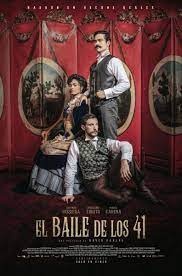
EL BAILE DE LOS 41/ DANCE OF THE 41
Mexico, 2020, 98 minutes, Colour.
Alfonso Herrera, Emiliano Zurita, Mabel Cadena, Fernando Becerril.
Directed by David Pablos.
This is a Mexican film with a setting at the beginning of the 20th century, the transition from 19th-century society, a commentary on public morals and private morals.
The strong theme is that of homosexuality, the prevalence of homosexuals and gay activity amongst the upper classes, some detailed presentation of their private and secret lives, up to the ball of the title. It is also the story of closeted men, homophobia, and public attack on homosexuals.
At the centre of the film is a government official, Ignacio, married but not relating well with his native Mexican wife, her desire to have a child. He goes through the formalities of marriage, public appearance of the happy marriage. However, he belongs to a group of homosexuals who gather secretly, enjoy each other’s company, cultivate relationships.
There is a crisis in the film when Ignacio meets a young man and begins a relationship with him, bringing him to the club, his initiation, and the leading up to the traditional more of the 41 members of the club. However, it is rated, the men arrested, publicly humiliated. However, Ignacio is able to survive and there is a cover-up about his belonging.
Strong atmosphere, sets and decor, and invite into a secret world of the gay club.
- A Mexican story? Based on a true story? The turn of the 20th century? Mexican society? Politics? Homosexuality and society?
- The settings, the city, mansions and affluence, political buildings and offices, the men’s club, riding in the countryside? The musical score?
- The impact of the story at the time, homosexuality and the law, public opinion and condemnation, homophobia, the revelation of the club, the press, public denunciation, imprisonment?
- The focus on Ignacio, his place in society, in government and Congress, influence, ambitions, manipulating moves against politicians, discussions with the President, the President testing him out? The opening, the social gathering, the discussions with the President, Amada as his fiancee, the wedding ceremony? His secret life, double standards, hypocritical, treatment of his wife?
- The wedding night, his reluctance with his wife, fierce behaviour? The aftermath, the difficulty of doing his duty? His staying out late for work, for the club? Arriving late, the effect on Amada? Her concern and sending out the police? His morning arrival, dismissing the police?
- Amada, engagement, her background, Indian background, daughter of the President? The gathering of ladies, her half-sister, Luz? The continued clashes? The effect of Ignacio’s treatment? Lonely, the collapse, illness? Wanting a child? Ignacio and the separate room? Her appearing in public, hosting the dinner with her parents? The toll on her? Searching Ignacio’s desk, finding Evaristo’s letters? Her reaction, her hold over Ignacio, the threat with her skill with the gun, up the tree, firing?
- Ignacio, in the building, the encounter with Evaristo, the attraction, the drink, the beginning of the relationship? The effect on Ignacio, a loving experience, comparison with Amada? His inviting Evaristo to the club? Don Felipe, the veteran, the joking manner? Ignacio member of the club since he was 18?
- Evaristo, the arrival at the club, the ritual, blindfold, the promises, the welcome? The 41 members of the club? The range of ages, veterans, politicians? The cross-dressers? The company, the dinner, the orgy, the gatherings, the background of Carmen, the song from the Magic Flute, the vaudeville performances, the applause? The preparation for the annual Ball?
- The political background, the role of the president? Ignacio and his manoeuvres? The pressure on him, no prospect of success, his withdrawing? And the possibility of leaving the country with Evaristo?
- The buildup to the ball, the men gathering, half dressed as women, dresses and make up? The dancing? The police outside, the raid, hurting the men, in a circle, taking them out, in the street, exposed, the public ridicule, shame, exposure and violence?
- The president, his son-in-law being removed from the prison? Evaristo going to Yucatan, the news of his death?
- Ignacio, the formalities of the marriage, his political life, the cover up?
- Ignacio as an unsympathetic character, audiences and identifying with him on not, his situation? Identifying with Amada? Sympathy for her situation? Her strong character within the social confines of the time and Mexico? A film of 2020, exposure of homophobia?
Secret: Dare to Dream, The
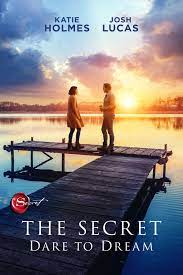
THE SECRET: DARE TO DREAM
US, 2020, 107 minutes, Colour.
Katie Holmes, Josh Lucas, Celia Weston, Jerry O'Connell, Sarah Hofmeister, Aidan Brennan, Chloe Lee, Katrina Begin.
Directed by Andy Tennant.
This film is based on a popular self-help book by Australian-born, Rhonda Byrne, published in 2006, with a documentary film made from it to which she contributed. She also contributed to this feature dramatisation of her book.
This is the kind of film that is easy for critics to deride but which becomes popular with a public. As it illustrates the power of positive thinking, it presents various scenarios which sceptics would be very critical of. However, it also shows the effect of people thinking positively and acting positively.
Katie Holmes plays Miranda, a widow with young children, her husband dead in a plane crash, an engineer. She tries to manage, working for a friend, Tucker (Jerry O’Connell) who is, more or less, her boyfriend. This arrangement is encouraged by her mother in law played by Celia Weston.
The main part of the story comes from the appearance of an engineer, Bray, played by Josh Lucas. He comes with a mysterious envelope for Miranda but she is not home, they have a slight crash on the road, Bray helping with the repairs, coming home, and helping with the repairs on the house. He is looked on with suspicion by the mother in law.
There is a revelation that he worked with Miranda’s husband, and suspicions that he had stolen a patent. However, a copy of the patient was in the envelope which he was delivering to Miranda when the accident happened. Miranda except Tucker’s proposal but is angry with Bray – until it is revealed that he had good intentions and was bringing her the gift of the patent. And a positive happy ending. The film was directed by Andy Tennant (Ever After, Anna and the King, Hitch – and, more latterly, The Kaminski Method for TV).
- The title? Based on the self-help, inspirational book, The Secret (and the documentary film of the title of 2004)?
- The power of positive thinking, optimism, knowing what you want before you ask for it…?
- The Louisiana setting, the weather and the oncoming storm, the water, fishing, the market, restaurant? Home, interiors? The countryside? The flashbacks to Vanderbilt University? The musical score?
- Miranda, age, widow, three children? At the market, bargaining, tough stances? With Tucker, friendship, work? Eventual proposal? The dentist and the cost of root canal? Insurance? Broke but not poor? Bess wanting a pony?
- Bray, the mysterious envelope, the encounter with Greg, their secret, the envelope? Miranda crashing into him? His reaction, reassuring, offering to help, following the family home, his solution for the repairs, the achievement? His motivations, explanations of his philosophy of life? The later revelation about his sadness, wife, divorce, her infidelity? His coping, his aphorisms and their being quoted? His hesitation in giving Miranda the envelope, putting it in the letterbox, its being washed away by the storm, the later recovery and the document?
- Miranda, the children, driving them home, Missy and her 16th birthday party, Bess and the lie at school about the pony, Greg at home, is inventiveness? Family life, meals? The response to Bray? The discussion about pizza, its arriving – sent by Tucker?
- Bray, the hotel, the room, the view, friendly with the receptionist and encouraging her studies?
- The storm, electricity, the tree coming through the house, the family sheltering in the bath tub? The aftermath, Bray and his offering to help, the summary of the costs, the material, his work, the skylight?
- Bobbie, mother-in-law, intervening in Miranda’s life, favouring Tucker? Suspicious of Bray? The invitation for the family to stay with her? Her reaction to the rebuilding of the roof? Her advice for Miranda to sell? The party, her presence, Tucker and his proposal, Miranda taken aback, consenting? Her reconsideration, telling the children she should have consulted them, giving Tucker back the ring, explaining to Bobbie?
- Missy, discussion with Bray, what she wanted, the toffee making, the balloons, the visitors, her joy, the toffee?
- Bobbie, googly, the truth about Bray, Miranda upset, the flashbacks, Bray with Miranda’s husband, the invention, her accusations? Sending him away? Bray returning home? The scenes at home – suggestion that Jennifer was his wife, teasing the audience, his sister?
- The document delivered, the truth about the patents, the finances – and Miranda paying off debt, teeth fixed… Her decision to go and visit Bray, his coming to her, Miranda and the discussions with Jennifer? The phone calls on their travels?
- The happy ending?
- Audiences and the response to hope, romance, positive thinking? Other audiences dismissing the film as schmaltzy, cheesy…?
Falcons, The/ Iceland
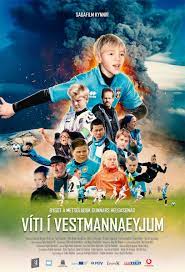
THE FALCONS
Iceland, 2018, 97 minutes, Colour.
Directed by Bragi Thor Hinriksson.
This is a children’s film from Iceland. It also has an adult interest and appeal. For those who enjoy the landscapes and icescapes of Iceland, there is much to enjoy.
It is also a football film, with many of the matches staged, scores shown, tactics and rough play. At the centre of the film is a young boy, Jon, lacking in confidence but gradually gaining as he plays in the matches. But, he is also threatened by a bully in the team, Ivar. What makes a difference to the film is that it is revealed that Ivar is being bullied by his father, excusing his father by saying that he is sick, but getting the support of the boys in the team. The to go to the police but discover that the police chief is Ivaar’s uncle!
Important themes for children, self-confidence, growing up, affirmation, the role of sport, the experience of bullies, an understanding of bullies and trying to help.
- A film for children’s audience? Family audience? Adults?
- The Iceland settings, Arctic, in summer, the island, the scenery, the volcano? The musical score?
- Children as central characters? Sport? Children’s issues, self-confidence, friendship, bullying, competitiveness, family secrets, combating them?
- The children on the boat, arriving on the island, the competition, the portrayal of the games, the action sequences, competition, the scores?
- The Falcons, on the boat, John, lacking self-confidence, his friendship with Skuli? Teamwork, in the games, John holding back, cause of the accident for School it, hospital?
- The competitive team, in play? Either, big, confronting, bullying?
- The development of the competition, the film’s interest in the characters, the revelation about either and his being bullied by his father? John and the boys taking a stance? Report to the police – not believed, the father’s brother as police chief?
- The bonding amongst the boys? The decision to help, to support Ivar?
- The symbolic background of the scenery, the volcano, John’s initial dream and the corruption? The smouldering volcano, corruption?
- The central characters as pre-teen? The impact of the film for this age group and the issues that it races? For all the children? The parents?
Mustang, The/ 2019

THE MUSTANG
Belgium/France, 2019, 96 minutes, Colour.
Matthias Schoenaerts, Jason Mitchell, Bruce Dern, Gideon Adlon, Connie Britton, Josh Stewart.
Directed by Laure Clermont de Tonnere.
The is a prison film – but with some differences. Matthias Schoonaerts plays Roman, in prison for the brutal attack on his wife, conscious of his bad temper and repentant. Bruce Dern plays one of the prison supervisors, in charge of a program where local horses are tamed and trained. Roman, with the help of friend, Henry, Jason Mitchell, takes on a very difficult horse Marquis and becomes very attached to him.
There is a complication when his daughter comes to visit him, unhappy memories.
There is also a complication when Roman’s friend, Dan, is murdered by a roommate.
Encouraged by Myles, Roman continues work with Marquis but is injured in a fall. However, with the gate open, he allows Marquis to escape.
Resigned to his life in jail, Roman is visited by his daughter who tells him she is pregnant and will name her child after him. And, he has a glimpse of Marquis standing near the gates of the compound.
The film is the first American film by French actress and director, writer Laure Clermont de Tonnere.
- The title? A film for those who love horses? The Mustangs in the Western states, roaming wild, captured, euthanised? The auctions and the training by prisoners?
- The Nevada scenery, isolated, the open plains, the mountains? The prison in this context? Fencing, wires? The interiors, the cells, the passageways, the recreation area? The corrals with the horses? The musical score?
- Roman and his story? The assault on his wife, her permanent injuries, the effect on his daughter? Her coming to visit, her resentment? The gradual revelation of his story? 12 years in prison, sullen, humourless? Arriving at the prison, allotted to the cell, his cellmate, taciturn, helping him later with the drugs, sprinkled on the vests? With the authorities, taciturn? The interview with the psychologist? The routines of prison life?
- The Mustangs, the opening credits, the aerial sequences of the Mustangs racing, the helicopter guiding them, the magnificence of the animals, rounded up, the corral?
- The prison plan, the men to tame the horses, get them ready for the auction? Myles, his age and experience, tough, hard on the men, guiding them, ordering them? Some praise? The time taken to tame the horses, his patience?
- Roman, going to the horses, his rough handling, anger? The gradual bonding with the Mustang? Riding, falling? Myles coaching him? Gradually controlling him, riding in line, reverse? The importance of the bonding for Roman?
- The other prisoners with the horses, Henry, genial, black man, the drugs issue? With the horses, friendship with Henry, jokes? His being attacked in the yard, his death? The other men, especially the skill of the Native American, the old man with a moustache…?
- The symbolic parable between Roman and the horse, both rebellious, and willing to be subdued, the taming experience, making concessions?
- Martha and her visits, resentment, pregnancy, memories of her mother, Roman in prison but Martha having to look after her mother and care for her year after year? Roman inviting her to the auction, not coming, later sending the photo? Roman as grandfather?
- The auction, the crowds gathering, sitting on the benches, the applause, the emotion of the national anthem? The display of the horses, riders with flags? The Native American and his writing, the first was to be sold?
- The auction not quite going as the audience expected, Roman, success, falling from his horse, the horse’s violent reaction? Roman and his injury?
- The closing of the program, Myles and his leaving, talking with Roman, indicating that the doors could be open, Roman with the horse, letting it go, going back to the hills?
- The psychologist, the group work, Roman participating, the effect?
- Roman, continuing to serve his sentence, more subdued and accepting, and the Mustang returning and then leaving?
First Friday, Chevalier Family Justice and Peace, a culture of Encounter
First Friday, Chevalier Family Justice and Peace, a culture of Encounter
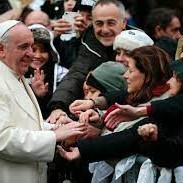
The Chevalier Family poster
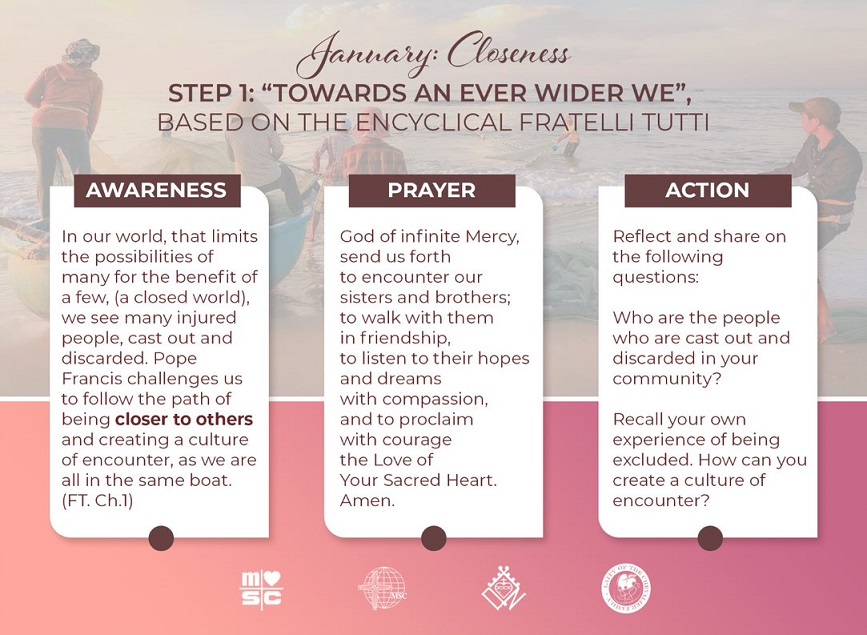
And encouragement from Pope Francis
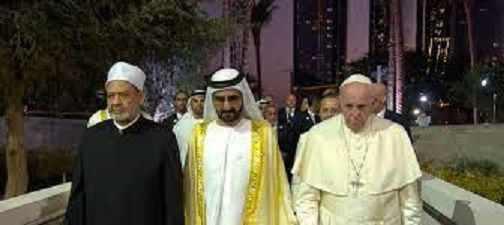
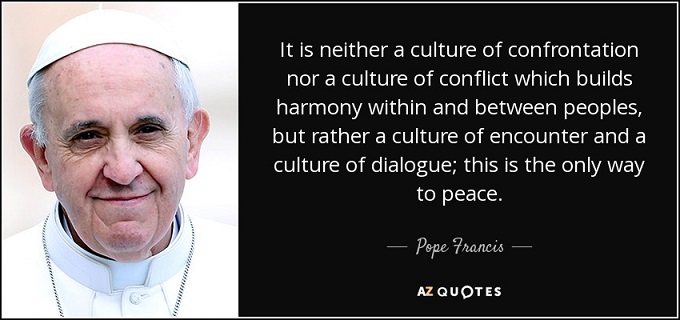
Matrix Resurrections, The
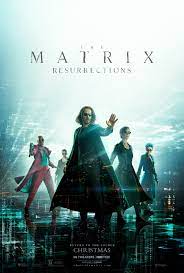
THE MATRIX RESURRECTIONS
US, 2021, 148 minutes, Colour.
Keanu Reeves, Carrie-Ann Moss, Yahya Abdul-Mateen II, Jonathan Groff, Jessica Henwick, Neil Patrick Harris, Jada Pinkett Smith, Priyanka Chopra Jonas, Christina Ricci, Lambert Wilson, Andrew Caldwell.
Directed by Lana Wachowski.
While mathematicians and philosophers were comfortable with the word, Matrix, it wasn’t part of everyday language. But, 1998, the release of The Matrix, and it is part of ordinary vocabulary. Then there were two sequels, reinforcing the first, admired as welcome sequels by some, attacked as not being as good as the original by others.
Which is, perhaps, a dicey statistic when considering a fourth Matrix film, especially after a gap of 18 years. Well, here it is, focusing on Keanu Reeves Tom Anderson, best known as Neo, the One. (After his becoming so well-known in the Matrix trilogy, Reeves has become in many film fans minds, John Wick, a trilogy there but also a fourth film in the offing.) And, the question as to whether Carrie-Anne Moss will be back as Trinity, whether Laurence Fishburne will be back as Morpheus, or Hugo Weaving as Agent Smith, black suit, dark glasses. A yes to Carrie-Anne Moss, Laurence Fishburne seen in a number of flashbacks, and the news that Hugo Weaving had a clash of commitments (glimpsed momentarily in some of those flashbacks) but was not available to resume his character.
Only one of the directing Wachowskas is back, Lana. But, the production design gathers up all the tradition of the previous films – and then some.
The issue as always been about the Matrix and the existential questions of what is fiction and what is reality. And, where do we as ordinary human beings live? Are we Digital Sentients (now there’s an interesting term) or human beings trapped in the destinies of computer games. Since the screenplay raises these questions again, we are continually tantalised throughout the narrative as to what is the real world, what is the imagined world, what is personal dream, what is game programming controlling the life of the protagonists. And this is what happens to Neo/Tom throughout the action.
He has retired from prominent public action, is employed by a company of computer gamers, works away at his desk – but, some of those who knew him in the past, as well as a new generation of admirers, want to find and resurrect him, Morpheus included, younger, perhaps ageless, form (Jonathan Groff) and a hyperactive warrior, Bugs (Jessica Henwick).
Which means then that we are moving from one reality to another, seeing Neo/Tom plugged into a machine, living out his fantasies, the search for Trinity and finding her in the form of a housewife with children, Tiffany, mending motor bikes, moments of torture, moments of fighting, of power-repelling bullets, all those strengths and qualities he has had from the earlier films. At times we see Neo/Tom with his long hair and beard. At other times, momentarily unrecognisable, he has lost his beard, retaining stubble, and his head shaved. And, as always, the question, who is real?
The screenwriters exercise a shrewd wheat at the beginning (though not shrewd enough to ward off the naysayers), by referring to the previous films, to discuss sequels, especially sequels after a long period. But, this is what computer game designers can do, re-create, re-vivify the past stories. There is some humour in this self-referential discussion, meaning that we are to take this very seriously, but perhaps not too seriously.
But, there is a very serious character, a psychoanalyst, played by Neil Patrick Harris, seen at first in counselling sessions with Neo/Tom, but gradually being revealed as one of the controllers.
Those who have never seen any of the Matrix films, the plot is somewhere between lucid and incomprehensible. But, with all the effort going into this new version of Matrix with all the different resurrections, it is a pity that the fans seem to be so condemnatory.
- The status of the initial The Matrix? The impact of the two sequels? Now a gap of 17 years, the fourth film and its impacts?
- The work of the Wachowskis, this film directed by Lana Wachowski? Drawing on the original films and scenarios? The return of characters? The return of Neo with Keanu Reeves, Trinity with Carrie Ann Moss, the versions of Morpheus and Agent Smith?
- The 21st century, the visuals, the special effects? The ordinariness of some sequences, the offices for computer games, for business management? Thomas Anderson and his ordinary life? The contrast with the matrix sequences, the visuals, other worlds, costumes and decor? Musical score?
- The initial discussion about the matrix stories, computer games, the possibility of rearranging the stories, even of making sequels? The light touch, but serious?
- Neo and his faint memories, becoming Thomas Anderson, the coffee shop, the encounter with the woman, her story, marriage and family, stern of memories that she was the basis for Trinity?
- The fans, Bugs and Morpheus, creation of the pods, the starship, Anderson and Tiffany in the pods? The different scenarios, reliving, changing, interventions?
- The appearance of characters from the past, not ageing, their stances?
- The psychiatrist, Anderson and his sessions, the growing influence of the psychiatrist, the pills, the control, the revelation of his role, dominant, evil power, confrontation?
- The drama, physical, psychological, the aim to restore the original Matrix, the role of Smith, business, Agent Smith? Conflicts, the emergence of the psychiatrist, revelation as The Analyst, his playing with time, control?
- The different planets, the different worlds, aspects of the Matrix, Niobe and her influence? Sati, her story, her mother, going into action? The presence of Bugs, her character, goals, collaboration with Anderson?
- Anderson, becoming Neo again, Tiffany and her family pleading to her to return, her coming to consciousness as Trinity? The defeat of Smith? The subjugation of The Analyst?
- Going to the top of the skyscraper, the risk of flying powers, Trinity discovering hers, safety?
- Future prospects for the Matrix?
House of Gucci
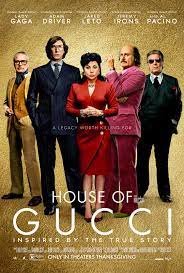
HOUSE OF GUCCI
US, 2021, 158 minutes, Colour.
Lady Gaga, Adam Driver, Al Pacino, Jeremy Irons, Jared Leto, Jack Huston, Salma Hayek, Camille Cottin, Reeve Carney.
Directed by Ridley Scott.
House of Gucci, House of Versace, Italian fashion houses with violence in their history. (Not quite like the histories of the French Houses of Fashion.)
Ridley Scott, filming at the age of 83, with a celebrated wide variety of film topics (just remembering Alien, Blade Runner, Thelma and Louise, Gladiator) directed two films for 2021 release, the intriguing The Last Duel and the Middle Ages, and an immersion in Italian families’ fashion with the Guccis.
Immersion – 158 minutes of living with the Guccis who are not always good company. They might have been good company, running a solid company, but there is always human nature and Italian passion.
The cast, of course, is an impressive lineup. Adam Driver, villain of The Last Duel, plays Maurizio Gucci, brought up in luxury, but rather unprepossessing at first, studying law, attracted by the flirtatious and oncoming Patrizia Reggianni. It would seem that for most of the film he is the good guy! But, there is that human nature factor again as he assumes arrogance and is destined for a fall, in terms of the role of CEO but, then for vengeful vendetta, target of a hit in the streets.
Researching any history of the Gucci family will quickly reveal that it is Patrizia whose desperate story this is. Ambitious daughter of the head of a trucking company, she sets her sights on Maurizio, is dismissed by Maurizio’s father, the aristocratic former screen star, Rodolfo (Jeremy Irons) as a golddigger. At this stage, especially when the couple marry, and Maurizio was cut off by his father and works in his wife’s father’s trucking company, that she is not quite the golddigger we could have imagined.
But she is. And more. And, it is a tribute to Lady Gaga, who does not have a large list of screen roles, but prominent in the 21st-century interpretation of A Star is Born, that she comes across as a woman who is determined, takes opportunities, sets family members against each other, tries to take control, becomes entangled with family disputes (some of which she engineers), but ultimately does not have the power to achieve her goals. And she takes refuge in a television personality who foretells the future, Pina (Salma Hayek) becoming more and more dependent on her, even to arranging the hitman and the financial deal for the death of her husband.
And, there is a subplot involving Rodolfo’s brother who acts as the CEO of the fashion company, uncle Aldo, played by Al Pacino (as he turned 80). Then there is his bizarre son, Paolo, a heavily made up an unrecognisable Jared Leto, who is mocked by the rest of the family, considered an idiot by his father, but who is desperate to make an impression in the family and to find a place in the House of Gucci.
More than enough ingredients, one might say, but, in fact, the first five years of the marriage is played out in quite some detail but, after that, the next 12 years or more seem to be hurried through, rather difficult to know what is happening year by year because some of the developments in the screenplay are rather more sweeping.
There is a lot of information at the end of the film about what happened to the conspirators (tried and condemned to prison), the fact that there is no Gucci family member part of the current company (developed by Rodolfo Gucci’s assistant, Domenico De Sole, Jack Huston, with the help of the up-and-coming designer, Tom Ford, who is still there).
So, an Italian tale of intrigue and ambition and murder as vengeance. A fall of the House of Gucci and its self-destruction.
- The film? A period of 20 years? The house of Gucci? Reputation, leaders, politics, greed, vengeance, manipulation? Portraits of the chief characters?
- 1978, Milan, social life, the Gucci family, the company? The 1980s, expansion of the company, struggles for leadership? The 1990s, international changes, the family members, Maurizio and his leadership, Patrizia Regianni and her vengeance?
- The musical score, the range of songs of the period, the Opera excerpts?
- The focus on Patrizia, 25, self-image, flirtatious, working in her father’s office, the invitation to the party, setting her sights on Maurizio, insisting, his response, the dancing, her calculating to meet him in the library, seeming innocence, her phone number on the motorbike? Their meeting, time together, his response, her being in love? Calculating? The visit to his father, his father’s courtesy but condemning her as a golddigger?
- The wedding, the celebration, his father’s absence? The link with Uncle Aldo, his role in the business, 50% share, his practical running of the business? Paolo, considered foolish, his look, manner, his wife, his ambitions, showing his designs to Rodolfo and Rodolfo ridiculing in? The tensions with his father?
- Maurizio, born into wealth, studying law, his quiet manner, the response to Patrizia, in love, sharing, the visit to his father and his father’s condemnation? Willing to be cut off financially? Enjoying his work at the trucking company? The wedding? His bond with his uncle? Clashes with Paolo?
- Patrizia, the birth of their daughter, her ambitions, taking greater interest in the firm, the background of her father’s trucking business? Her beginning to manipulate? The contact with Aldo, his spoiling her, the bag, clothes? The incident with the invitations, her disgust, Maurizio’s response, Aldo defending the cheap knockoffs and people enjoying allegedly having Gucci?
- Aldo, jovial, head of the firm, his disdain for Paolo but still loving him, the attraction to Patrizia and her enterprise? His lifestyle, the farm and the cattle? Pride in the company? The background of fraud, his being reported to the authorities, his arrest and humiliation, jail? Coming out of prison, the link with Paolo, the shares in the company sold, his angry signing things away?
- Paolo, ambitions, ineffectual, strange personality, with the members of the family, with his father, his being tricked, the runway episode, his wife singing, the authorities coming, the exhibition stopped?
- The years passing, Patrizia and her involvement, the pressure on Maurizio? The authorities, Maurizio escaping to Switzerland, Patrizia later joining him? The attraction to Paola? The alienation between the two, Maurizio and the pressure from Patrizia, taking more interest in the company, relying on Domenico, Patrizia’s attitude towards Domenico? His being the confidante of Rodolfo?
- Maurizio, running the company, ideas, discussions with Tom Ford and his designs, the runway, success, acclaim? But the business meeting, the partners, German background, financial difficulties, Maurizio’s optimistic assessment? Decisions, the takeover?
- Patrizia, seeing Pina on the television, ringing her, asking her fortune, the later meetings, the advice, Pina and her dependence on Patrizia? The bad prophecies? Patrizia, commissioning the hit on Maurizio, the thugs coming, the money dealings, Pina’s involvement? The occasion, Maurizio in the building, the shooters, his death?
- Patrizia, after his event, ousting Paola from the house, taking over – and in the news, two years later, the arrests, the trial, the sentences?
- The rise and fall of the House of Gucci?
Ghostbusters. Afterlife
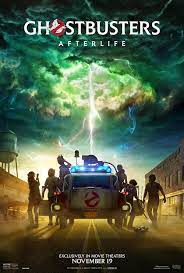
GHOSTBUSTERS: AFTERLIFE
US, 2021, 124 minutes, Colour.
Carrie , PauCoonl Rudd, Mckenna Grace, Logan Kim, Celeste O'Connor, Bill Murray, Dan Aykroyd, Ernie Hudson, Annie Potts, Sigourney Weaver, Bob Gunton, J.K.Simmons, Bokeem Woodbine, Stella Ackroyd, Olivia Wilde, Tracy Letts, voices of: Shohreh Aghdashloo, Josh Gad.
Directed by Jason Reitman.
Ghostbusters Jr!
If that is a disturbing alternate title and, as a devotee of the original film, you might want to reconsider. However, if you go along with this 21st-century variation on the theme, help is at hand towards the end when who should turn up but the real Ghostbusters, Bill Murray, Dan Ackroyd, Ernie Hudson and, because Harold Ramis, to whom the film is dedicated, died in 2014, there is a ghostly recreation of his presence. And, these are more than cameos, the three entering into the spirit of the busting of these recurring ghosts. (And, as some compensation for those who are not exactly on the Junior wavelength, there is a credit sequence where Sigourney Weaver turns up having a psychology session with Bill Murray; and, right at the end, an extended sequence where Ernie Hudson reflects on what happened and his aftermath success!).
The film was cowritten by Jason Reitman, son of Ivan Reitman, who produces here, and who directed the first two Ghostbusters films.
We are certainly no longer in New York City. We are in a drab rundown town in Oklahoma (although the exteriors were all shot in Alberta!). Single mother, Callie, and her son and daughter are evicted from their home and travel to a very rundown dirt farm left to Callie by her father. (And, to tantalise, there are mysterious chases and goes busting equipment at the opening of the film, racing towards the farm and the death of the old man.)
For a moment, this looks like one of those single mothers and children trying to make good in desperate circumstances, the son, Trevor, aged 15, pretending 17 (FinnWolfhead who would be a strong contender in a Timothee Chalamet lookalike competition) and Phoebe, 12, Mckenna Grace in a performance which really does control the whole film. She is precocious, bespectacled, articulate, scientist, sceptical of superstition, ever investigative, in command of what turns out to be the ghost busting operation. A very strong performance. And, fortunately for us and her, she befriends another 12-year-old at school, Podcast, who goes around with his camera and recorder, interviewing people. He is played by Lucas Kim who shows quite a sense of humour and excellent comic timing. Here’s hoping for a solid career for him.
And, there is school, desperate kids put in front of the screen to watch Cujo while the teacher, Mr Groobersman (Paul Rudd always enjoyably acceptable) carries on geographic investigations. A perfect match for Phoebe! There are daily rumblings and earth tremors, mysterious events…
And, by this time, we guessed it, the ghosts are somewhere there are in these Oklahoma mountains, gods from 3500 years ago, confined in an abandoned mine, ghosts and monsters ready to find the slightest excuse for erupting. And they do.
And, while Callie and Mr Groobersman are taken over by monstrous guard animals, it is up to the youngsters to do the ghost busting. But, they are apprentices and, to relief all round, Bill Murray and co-to turn up for a final confrontations. As does a ghostly re-created resurrected Harold Ramis who turns out to be Callie’s father and the younger generation’s grandfather.
Not sure how the older fans will manage, it is definitely for the younger, new fans.
- Ghostbusters Jr? 35 years after the original? Popularity, continuing popularity, the new generations?
- The Oklahoma settings, filmed in Alberta? The down and out town, yet the modern features, takeaway, supermarkets? Out of town, the dingy old farms, buildings, the abandoned mine? The underground caverns, the echoes of antiquity and gods? The musical score?
- The opening, setting the tone, the family, hard times, evicted, mother and children, going to the town, the inheritance from her father, the desolation of the farm?
- The opening tone, the vehicles, the machines, the country road, the bridges, the old farm, the Ghostbusters equipment, explosions?
- Callie, not knowing her father, resentment, single mother, coping with the two children, the landlord, eviction, trying to settle into the new house, the reaction of the children? The children going to school, her encounter with Groobersman and not being aware of the children’s activities, her being taken over by the spirit of the ghosts, the ancient religion, Groobermsman taken over? The appearance of the goddess, their being the sentries?
- The focus on the children, with their mother, 15 and 12, going to school, Trevor going to the diner, getting the job, the encounter with Lucky, the jeers of the other workers? His infatuation with Lucky, lying about his age? The contrast with Phoebe, 12, spectacles, intelligent, a reader, science, scepticism about superstitions? The investigations, her reading? At school, the encounter with Podcast?
- Podcast, his age, the interviews, questions, interest, right remarks, laughing at Phoebe’s bad jokes, his sense of timing?
- Groobersman at school, the students watching Cujo? Discussions with Phoebe, explaining maps, his own work, the tremors, the old mine, the geography, the mystery? The encounters with Callie, the meal with her? His being attacked? Transformed? He and Callie in subservience to the Goddess?
- The equipment, the children, destruction in the town, arrests, the Sheriff?
- The story of the mine, the young people investigating, the body of the founder of the mine, preserved? And his coming to life at the end?
- The discovery of the ancient religions, the mine itself, the lift, the deep holes, the goddess? Her coming to life, domination?
- The Ghostbusters arriving, their personalities, memories of the original? The youngsters, putting on the Ghostbusters overalls? The confrontation with the ghosts, the weapons, difficulties, Podcast and the breakdown of the fire, Phoebe proving herself a worthy Ghostbusters?
- Callie, finding the underground room, the mementos from her father? His reappearing, with the Ghostbusters, the revelation of his knowledge of disasters, the dates, 2021, his building all the equipment to prepare for the invasion of the ghosts?
- The special effects, the visuals of the ghosts and monsters, from vast animals to the impudent marshmallows?
- The resolution, the heroism of the children, Phoebe? The presence of the Ghostbusters? Callie and group united?
- The credits sequence, Sigourney Weaver and Bil Murray, the cards and the tests? The end, the focus on Ernie Hudson, his success? These additions to please the older audience?
Tesla
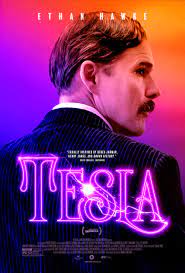
TESLA
US, 2020, 102 minutes, Colour.
Ethan Hawke, Eve Hewson, Josh Hamilton, Kyle MacLachlan, Ebon Moss-Bachrach, Jim Gaffigan, Lois Smith.
Directed by Michael Almereyda.
With 21st-century developments in electric cars, the name of Nikolai Tesla has become better known. However, the migrant from the Balkans to the United States in the 19th century, he had some significant roles in development of inventions, especially concerning electricity and his theories of AC/DC (with which Thomas Edison disagreed).
Over the decades, there have been quite a number of films about Tesla and his work. In more recent times there was The Current Wars, with Nicholas Holt playing Tesla (and Benedict Cumberbatch as Edison and Michael Shannon as Westinghouse). In this film, Edison and is played by Kyle MacLachlan and Westinghouse by Jim Gaffigan.
The film was written and directed by Michael Alma Raider, something of an exotic Dir in his choice of subjects and his visual style – versions of Shakespeare, Hamlet and Cymbeline, science fiction/fantasy creations, Experimenter, Marjorie Prime. It is the same with this interpretation of Tesla, as pictured biography but rather a perspective portrait, a genius, eccentric, clashing with Edison, electric theory, issues of finance – and is outliving his colleagues, dying at 87.
Ethan Hawke is Tesla, car MacLachlan Edison, acknowledging Edison’s genius but not making him likeable.
Financial entrepreneur JP Morgan also features, and his daughter And, if Hewson, her character introducing something exotic the beginning of the film, her being in our contemporary world and advising audiences to Google the name of Tesla and see the few references, especially in comparison with those for Edison.
Not for those who would want a clear biography and portrait of Tesla, but for those who are fascinated by interpretations.
- Audience knowledge of Nikolai Tesla? His scientific background? Innovations? Coming from Europe? Work in the US, with Edison, Westinghouse, JP Morgan? AC/DC, the 1893 World’s Fair lighting? His career, relationships, isolation, eccentricities?
- The stylised nature of this film, historical recreations, Ann Morgan and her voice-over, computer and the modern age? Comments about Google entries? Her going back, explanations?
- The visual style of the film, realistic, surrealistic, especially the use of colours?
- The introduction to Tesla, as played by Ethan Hawke? The explanation of his background, his being in the US, his theories, electricity, his experience with the cat and electric reaction? Working with Edison, in the factory, the other workers, the clash with Edison, Edison dominating, the death of his wife, his remarriage, his inventions, his patents?
- Tesla and his isolation, money issues, his working on motors?
- The scientific background, the financial background, the role of Westinghouse and his inventions and patents? Rivalries with Edison? JP Morgan, finance, wealth, interest in Tesla’s work, not liking him, the issue of AC/DC?
- The issue of the lighting for the World’s Fair of 1893? The role of Edison, the role of Tesla, interest in theories of electric current?
- Sziget, work, inventive, friend of Tesla, helping him, then leaving and working on his own?
- The development of electricity and its uses in the 19th century, electric light, the reference to the first execution by electrocution?
- Tesla and the years, reconciliations with Edison, the relationship with Ann Morgan, her finally breaking?
- The episode with Sarah Bernhardt, Tesla’s attraction, Edison’s support, the tour of the US?
- The personality and role of la Grande Dame?.
- Morgan, finance, the mines, Tesla becoming more and more on the outer? Theories, signals from Mars…?
- Part biography of Tesla – more of a perspective portrait?
